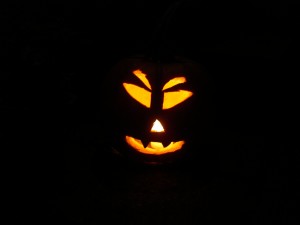The feeling of fear is a common human emotion. Everyone knows what if feels like to have your heart pounding against your chest, your jaw clenching, and butterflies fluttering in your stomach. But why do we deliberately seek opportunities that terrify us? Whether it is Halloween, a haunted house, the latest novel by Stephen King, or a suspenseful horror movie, it is obvious that there is a feeling of satisfaction associated with experiencing the supernatural.
Psychologists believe that putting ourselves in fearful situations is a method of emotional purging and development. Our brains are able to gauge the amount of impending danger we are in. Walking through a haunted house or watching a horror movie are artificial situations, and our minds are able to integrate that into our underlying awareness, which allows us to feel euphoria and fear simultaneously. The pranks and festivities of Halloween functions as a dress rehearsal for experiencing real fear or danger, especially for children. The minds of young children are not able to gauge fear as well as adults, but by providing a safe and controlled environment to experience utter terror, they are able to form coping mechanisms that develop their survival intuition.
To research the human fascination with the supernatural more in depth, make sure to check out some of the articles from our journal collection:
- “Haunted Prairie: Aboriginal ‘Ghosts’ and the Spectres of Settlement” from The University of Toronto Quarterly 75.2 delves into the ghost stories of Canada’s First Nations settlements, ideal for those thrill seekers who love a good ghost story
- “The Forensic Gothic: Knowledge, the Supernatural, and the Psychic Detective” from The Canadian Review of American Studies analyzes the use of paranormal phenomena in television series such as Medium and Supernatural
- For all the fans of the traditional fairy-tale, Modern Drama’s article “Hauntings: Anxiety, technology, and Gender in Peter Pan” explores the psychology of children and how J.M. Barrie’s classic story assists them in learning to cope with the anxiety’s associated with Neverland.
Happy Halloween from all of the Journals Staff at University of Toronto Press!

Comments on this entry are closed.